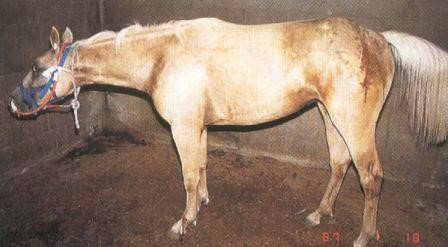What is tetanus?
Tetanus is caused by a bacterium (Clostridium tetani), which lives in the soil.
Although most animals can be affected, as a species, horses are particularly susceptible to tetanus infection. The bacteria enters the body through wounds, with punctures of the sole of the foot a common route of infection. The bacteria then cause disease by producing toxins that affect the nervous system.
Clinical signs include:
Horses with a tetanus infection become seriously ill very quickly and the disease is usually fatal despite attempts at treatment.
Picture 1: Horse suffering from tetanus infection

How do I stop my horse getting tetanus?
Fully vaccinated horses are able to neutralize the toxin before it can cause any ill effects and disease is completely prevented.
Tetanus vaccination for horses
All horses should be vaccinated against tetanus whether they are retired, companion or competition animals. The tetanus vaccination is very effective and requires an initial course of two vaccinations given 4-6 weeks apart. Boosters are usually given every two to three years depending on the brand of vaccination used.
Tetanus FAQs
Is tetanus an infectious disease in horses?
Yes, tetanus in an infectious disease of horses caused by contamination of a wound with soil containing the bacterium Clostridium tetani. However, tetanus is not contagious therefore cannot be passed from one horse to another.
What is the treatment for tetanus?
Treatment involves administering large repeated doses of tetanus antitoxin to help bind the circulating toxins and large doses of Penicillin. Other treatments are largely supportive and involve the use of sedatives, muscle relaxants, fluid replacement, wound debridement and slings. Treatment is expensive, labour intensive and often unrewarding and affected horses are often euthansed on welfare grounds.
How can I prevent my horse from getting tetanus?
Vaccination is essential in preventing the serious consequences of the disease, used alongside good stable management practices to reduce the risk of injury to your horse.
My horse has a cut and I am unsure of his vaccination status, what should I do?
Any wound large or small is at risk of becoming contaminated. If you are unsure that your horse is protected call your veterinary surgeon immediately. Depending on the length of time, which has elapsed since the last vaccination your vet, will administer either tetanus antitoxin and/or a tetanus booster.
Do I have to vaccinate my horse?
There are no legal requirements to vaccinate against tetanus but owners have a duty of care to protect their horse from disease under The Animal Welfare Act 2006 or The Animal Health and Welfare (Scotland) Act 2006. Most owners are aware of the life threatening nature of the disease and do not take the risk of leaving their horse unprotected.
My horse is elderly and has been vaccinated against tetanus for all of his life, do I need to continue?
Yes. The horse is the most susceptible of all the domestic species and regular vaccination is essential for protection. There is no age related immunity to the disease so an older horse is just as likely to become infected as a younger horse.